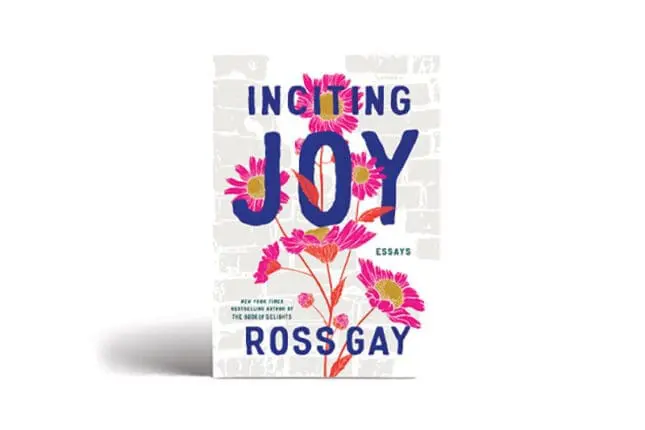Inciting Joy: Essays
By Ross Gay
Publisher: Algonquin Books
More than once, Ross Gay’s Inciting Joy made me feel sad. It wasn’t just a pinch of sadness, more like a gust of longing for something I couldn’t name. Just now, I was about to write that this response was “paradoxical” when I remembered that Gay is arguing quite the opposite—that sorrow and gladness aren’t just intertwined, but actually necessary to each other—and that our willingness to let this relationship unfold unimpeded is tied to our very survival.
Gay, an acclaimed poet and essayist, has written eloquently and exuberantly about joy before. He’s the bestselling author of The Book of Delights, in which he lovingly describes the small, unglamorous moments that have enchanted him, like a friend misusing air quotes and being waved at by people he doesn’t know. (Recently, he published a sequel called The Book of [More] Delights.) His poetry collection, Catalog of Unabashed Gratitude, won the National Book Critics Circle Award and was a finalist for the National Book Award.
But Inciting Joy takes us deeper into the heart of gladness, investigating not just what incites joy but also, critically, what joy can in turn incite. It’s not just contentment or even a greater sense of aliveness, though Gay would say both are wonderful outcomes. He wants us to consider an even more profound possibility, that “joy is an ember for wild and unboundaried solidarity.” And who knows what such communal care and witnessing can bring into our lives, and into our heartbroken world?
Gay organizes the book around 14 incitements to joy in his own life, from planting his garden (“Let it be said: there is no greater sucker for seeds than me”), to getting directions from strangers, to his teenage penchant for spinning his skateboard 360 degrees while leaping over dumpsters. There’s an essay on dancing hard and loose with friends and another on the bliss that overtakes him as he listens to covers of certain songs, one of his all-time favorites being Luther Vandross’s version of Dionne Warwick’s “A House Is Not a Home.” At first, each incitement seems like a self-contained experience—I get happy when I do this!—but slowly, you see that the activity both spurs and depends on larger, helping spirits, human and otherwise. As a reader, I began to see joy as a web of connections that are often invisible until you start to pay attention. Then, they’re everywhere.
Gay’s writing is extraordinarily rhythmic and propulsive, which incited in me bouts of involuntary smiling and head-nodding that felt pretty close to joy. No, it was joy. Here he is on pickup basketball, describing the tribe of regulars he used to meet up with on weekend mornings:
Little Nate, built like Spike Lee, a grasshopper, always wore sweats, hustled his ass off, came on his bike, and was the single person at that court to call me by my government name. That put-together kid with long braids and only one hand, who went to the hole like Marshawn Lynch. . . . Jay, a tough guard who defended and knocked you around and liked to yell and laugh and pass to himself off the backboard twenty years before LeBron was doing it and who acted to me like an uncle, like a big brother, when I told him I was in school up at Temple, saying, Alright Beast, alright.
It’s easy to understand how many of the incitements Gay describes—shooting hoops, co-creating a community orchard, writhing with laughter—would both spur and spread gladness. Less obvious, and of deep relevance to therapists, is how despair could possibly incite anything resembling joy. His short answer: it’s incredibly hard.
The longer answer arrives in “Grief Suite,” the most emotionally naked and affecting essay in the book, in which Gay recounts his own plunge into severe anxiety and depression in his 20s, triggered by a college football coach’s vicious verbal attack, which in turn, elicited an agonizing childhood memory that made Gay want to weep, but he couldn’t, because every message he’d gotten as a young man and a Black person was that he could not crack, not ever, ever, ever. Instead, he rammed his grief deep inside and began to resolutely turn his back on loved ones who were struggling similarly. He started to drink, daily and hard, and then, finally, began to wonder if he could stay alive.
How Gay climbs out of his suffocating hole and arrives back into “the grave light of joy” is a long labor. I would’ve liked more particulars—stories, scenes—about the experiences that allowed him to recover. What he does make clear is that he’s alive today because, finally, he dropped his deadly pose of “the need-nothing bootstrapping, solitary conqueror-dude” and acknowledged his own clamoring, abandoned heart. We’re all grieving something, he says, and grief can connect us if we’d only let it. When we speak our sorrow and make room for another’s young and quivering self, “we fall apart into one another.” And one name for that experience of falling, he says, is joy.
There was a time when I wouldn’t have believed Gay, when I’d have muttered, “yeah, whatever,” because I knew, was absolutely convinced, that to reveal anything about my flailing inner self would trigger a mass exodus of everyone who cared for me. I clung to this position for a good chunk of my adult life, until a friend somehow persuaded me to attend a weekend personal growth workshop, which started with everyone sharing why they’d come. When it was my turn, I stood up and said I was writing a book and felt stuck. True enough. But come on.
For the rest of that day, I participated in all the exercises and continued to talk about my book, how I seriously doubted I could meet my publisher’s deadline, and so on. When I awoke the following morning, I felt wretched. I dragged myself to the workshop and slumped into my seat for morning circle. Yet, when our group leader asked who wanted to go first, my body shot up like a rocket.
“I’m so lonely,” I heard myself say, whereupon I burst into tears. For a minute, that’s all l did. Then, between shuddery breaths, I found myself telling the group that I wanted so badly to belong but that whenever I stood up in circle to talk, people looked back at me blankly and I couldn’t bear it. Then, I was talking about my brother, the seemingly unbridgeable distance between us. And I stood there in front of everyone and cried some more.
I don’t recall what the facilitator said or did. What I remember, vividly, are the other participants, who streamed up afterward to hug me and say how what I’d shared had affected them, that they often felt lonely too, that they had a brother—or someone—they couldn’t connect with either. Then came the notes. Each of us had a “mailbox” where people could leave messages for each other, and until that morning I’d gotten exactly none. Now I found my box crammed with notes of empathy and encouragement, which I’ve kept in a folder all these years to remind me that people care for me not in spite of who I am, but because of who I am—the whole floundering, hopeful mess. And that I care for them the same way. Who knew? I truly had not.
The experience of genuine connection is its own reward, Gay would say, and we should celebrate it for all we’re worth. But there’s even more at stake. He contends that belonging to each other, and the joy we take from it, is a profound act of defiance. That’s because when we care for each other, we resist the prevailing capitalist gospel of scarcity, which makes other human beings, by definition, obstacles and opponents. In Gay’s words, “Our fundamental connection to one another, the raft through the sorrow, the holding through the grief joy is, reminds us, again and again, that we belong not to an institution or a party or a state or a market, but to each other.” We must connect and care, he says, “as though our lives depended on it.”
So, join the game—whichever joy-provoking one you’re drawn to. Pass the ball; bring the snacks. Risk being real; hold your most desolate friend. On nearly every page of this stirring, often hilarious, but always deeply serious book, Gay shows us how.
Marian Sandmaier
Marian Sandmaier is the author of two nonfiction books, Original Kin: The Search for Connection Among Adult Sisters and Brothers (Dutton-Penguin) and The Invisible Alcoholics: Women and Alcohol Abuse in America (McGraw-Hill). She is Features Editor at Psychotherapy Networker and has written for the New York Times Book Review, the Washington Post, and other publications. Sandmaier has discussed her work on the Oprah Winfrey Show, the Today Show, and NPR’s “All Things Considered” and “Fresh Air.” On several occasions, she has received recognition from the American Society of Journalists and Authors for magazine articles on psychology and behavior. Most recently, she won the ASJA first-person essay award for her article “Hanging Out with Dick Van Dyke” on her inconvenient attack of shyness while interviewing. You can learn more about her work at www.mariansandmaier.net.












